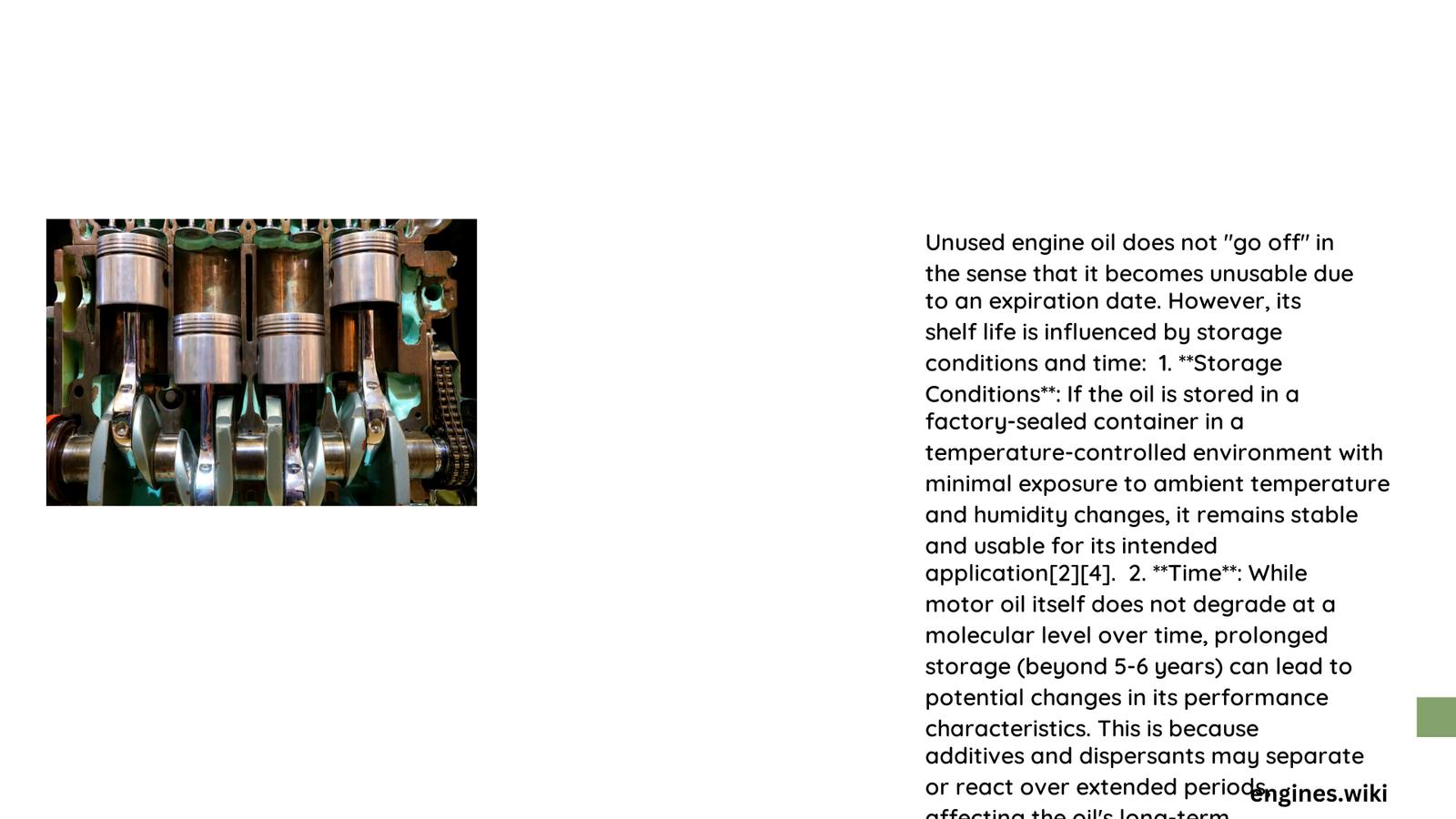Unused engine oil can indeed go off over time, with its quality and performance potentially deteriorating due to various environmental factors. Vehicle owners and mechanics must understand the critical aspects of oil storage, chemical changes, and preservation techniques to ensure optimal engine protection and longevity.\n\n## What Happens to Unused Engine Oil Over Time?\n\nEngine oil is not immune to degradation, and several factors contribute to its potential deterioration when left unused. The primary concerns include:\n\n- Chemical Oxidation: Exposure to air and temperature fluctuations can cause molecular breakdown\n- Additive Depletion: Performance-enhancing components gradually lose effectiveness\n- Contamination Risks: Improper storage can introduce moisture and particulate matter\n\n### How Long Can Unused Engine Oil Last?\n\n| Storage Condition | Estimated Shelf Life |\n|——————|———————-|\n| Ideal Conditions | 2-5 years |\n| Poor Conditions | Less than 1 year |\n| Sealed Container | Up to 5 years |\n\n## What Causes Engine Oil to Degrade?\n\nMultiple environmental and chemical processes contribute to engine oil degradation:\n\n1. Temperature Extremes\n – High heat accelerates molecular breakdown\n – Cold temperatures can cause oil thickening\n\n2. Oxygen Exposure\n – Continuous air contact triggers oxidation\n – Breaks down oil’s molecular structure\n\n3. Moisture Contamination\n – Water introduction leads to potential corrosion\n – Reduces lubricating properties\n\n## What Are the Signs of Oil Degradation?\n\nDetecting compromised engine oil requires careful observation:\n\n- Color Changes: From amber to dark brown or black\n- Consistency Alterations: Increased thickness or thinning\n- Sediment Presence: Visible particulate matter\n- Unusual Odor: Burnt or rancid smell\n\n### How to Properly Store Unused Engine Oil?\n\nTo maximize unused engine oil’s longevity, follow these guidelines:\n\n- Store in original, sealed containers\n- Keep away from direct sunlight\n- Maintain consistent, moderate temperatures (50-70°F)\n- Store in dry, clean environments\n- Avoid temperature fluctuations\n\n## What Risks Exist from Using Expired Oil?\n\nUsing degraded engine oil can lead to significant mechanical issues:\n\n1. Reduced engine lubrication\n2. Increased friction and wear\n3. Potential corrosion of engine components\n4. Decreased overall engine performance\n5. Higher risk of mechanical failure\n\n### Can You Test Unused Engine Oil’s Quality?\n\nProfessional oil analysis can determine:\n\n- Current viscosity\n- Additive composition\n- Contamination levels\n- Potential performance degradation\n\n## Recommendations for Engine Oil Management\n\n- Purchase Appropriate Quantities: Buy only what you’ll use\n- Check Manufacturing Date: Prioritize fresher oil\n- Inspect Before Use: Always verify oil condition\n- Follow Manufacturer Guidelines: Adhere to specific recommendations\n\n### Conclusion\n\nWhile unused engine oil can go off, proper storage and management significantly extend its usable life. Regular inspection, appropriate storage, and understanding degradation factors are crucial for maintaining oil quality.\n\n### Reference:\n- SAE International Oil Analysis Guidelines\n- Society of Automotive Engineers Research\n- Automotive Lubrication Research Center

